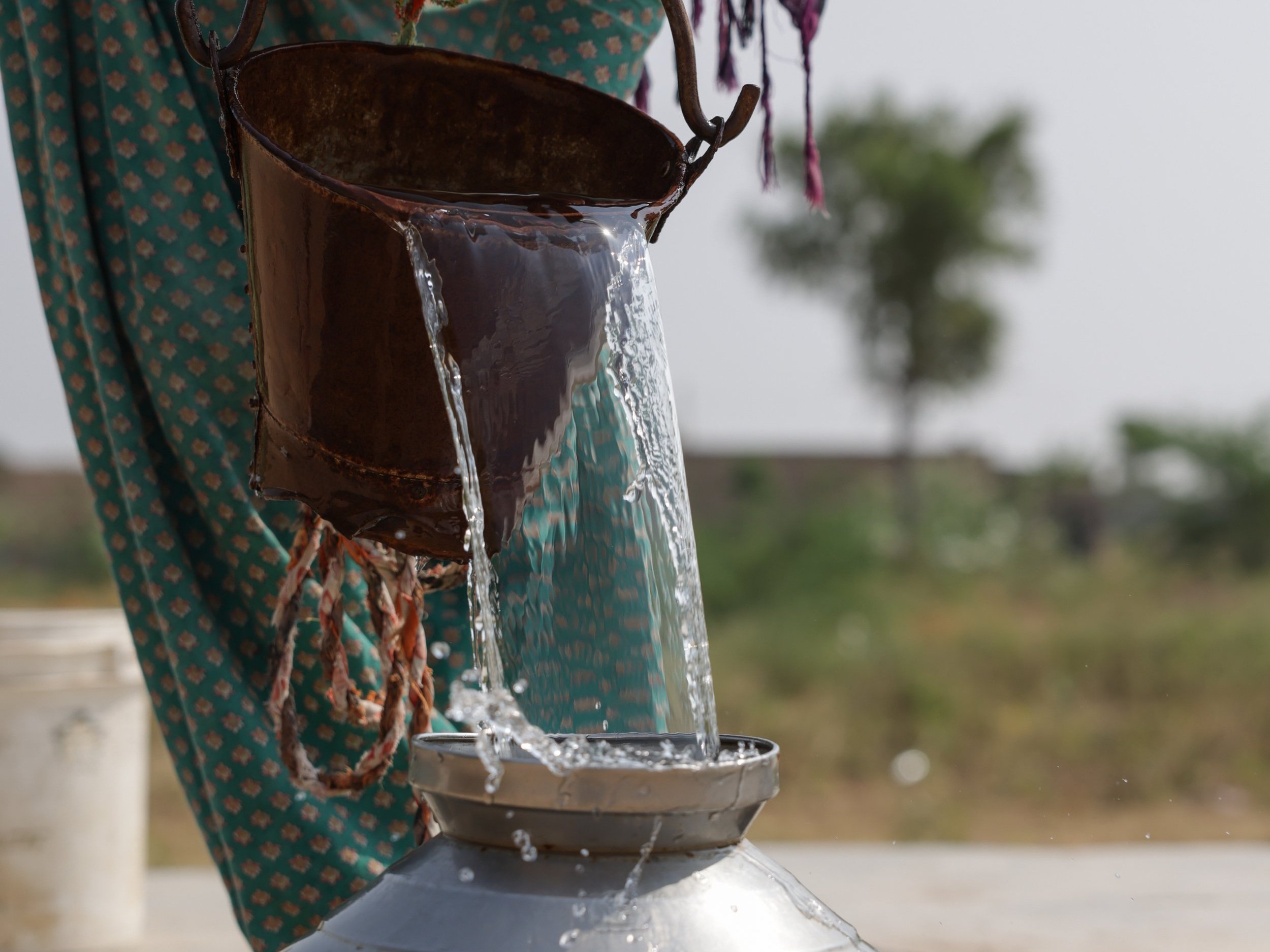
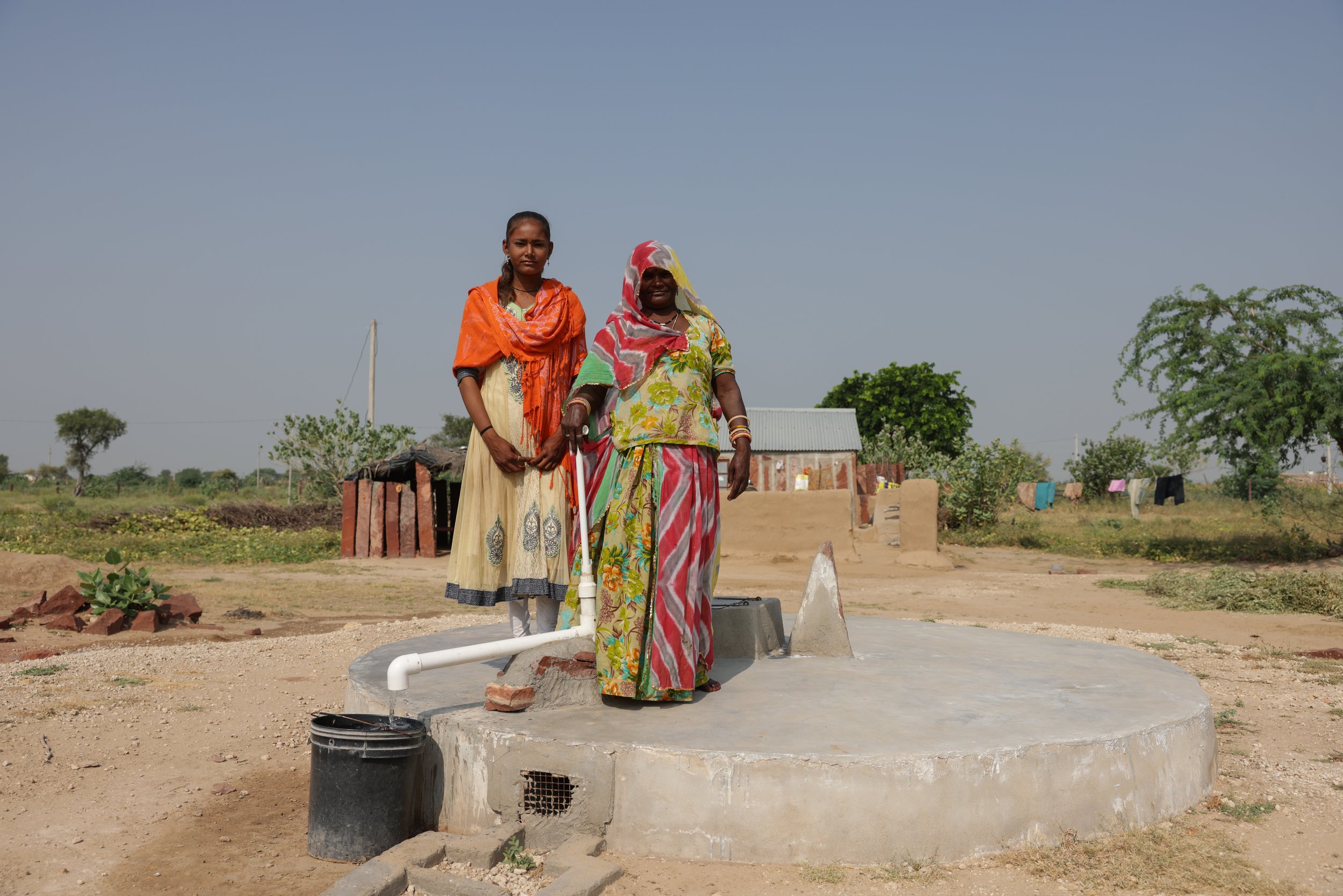
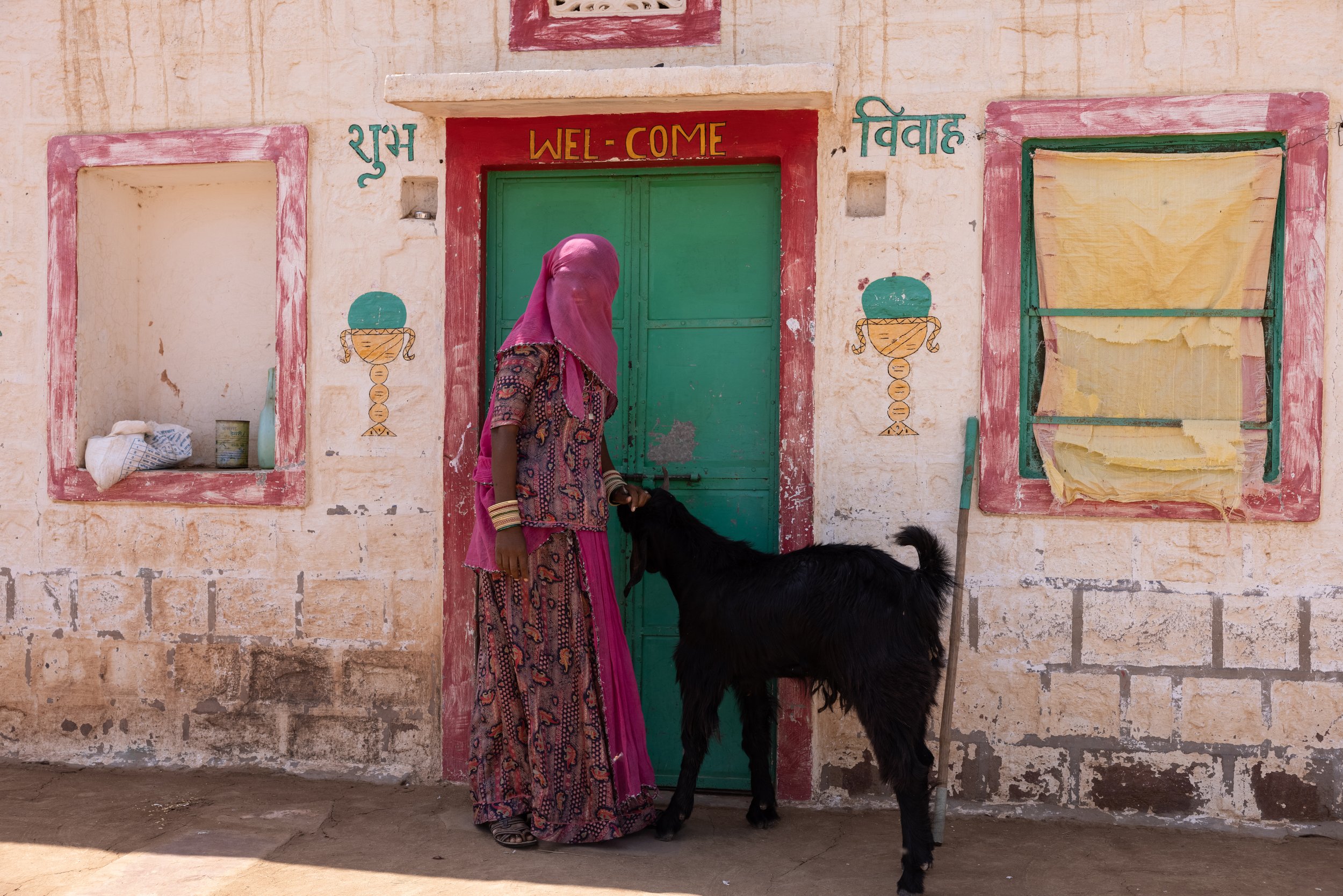
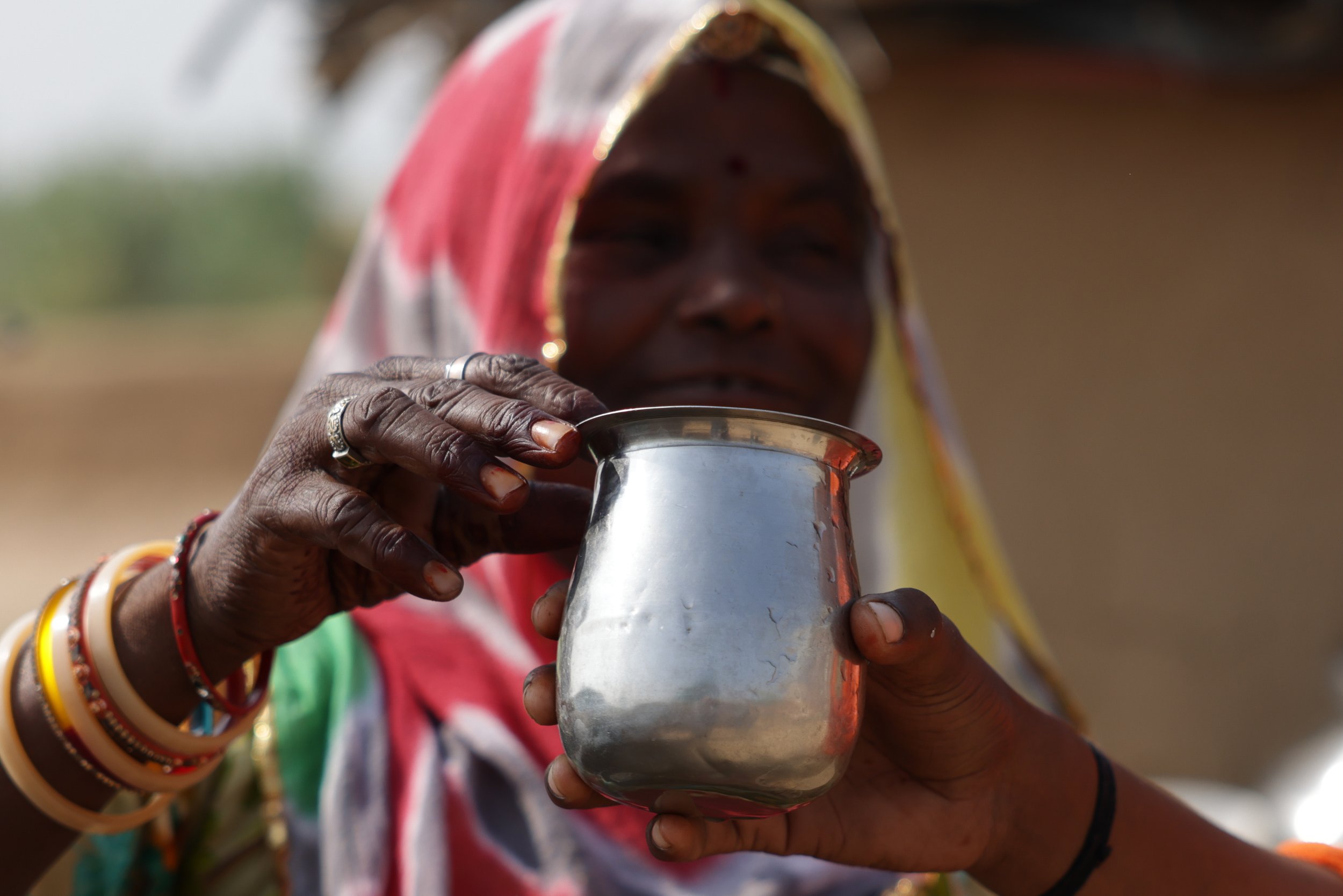
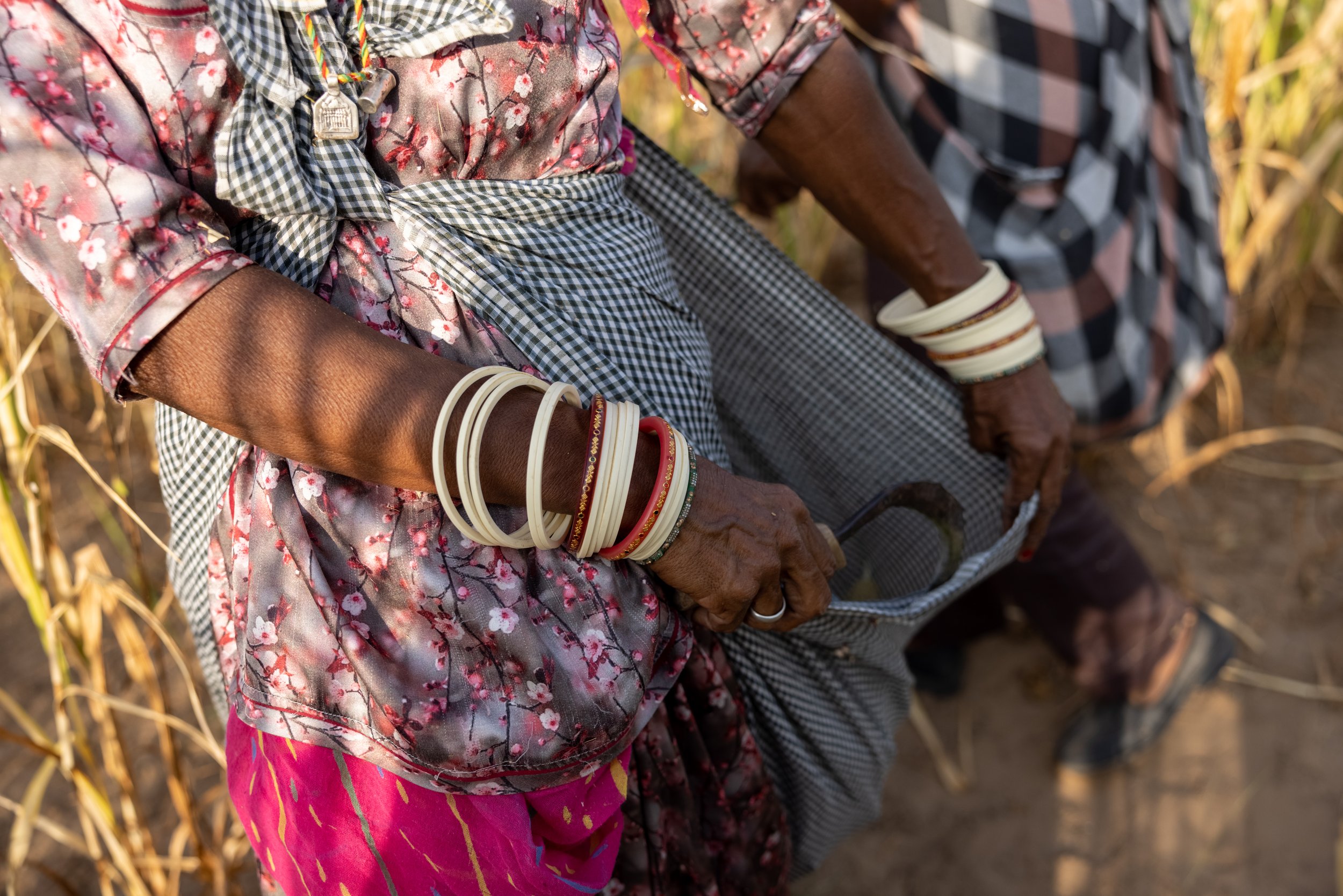
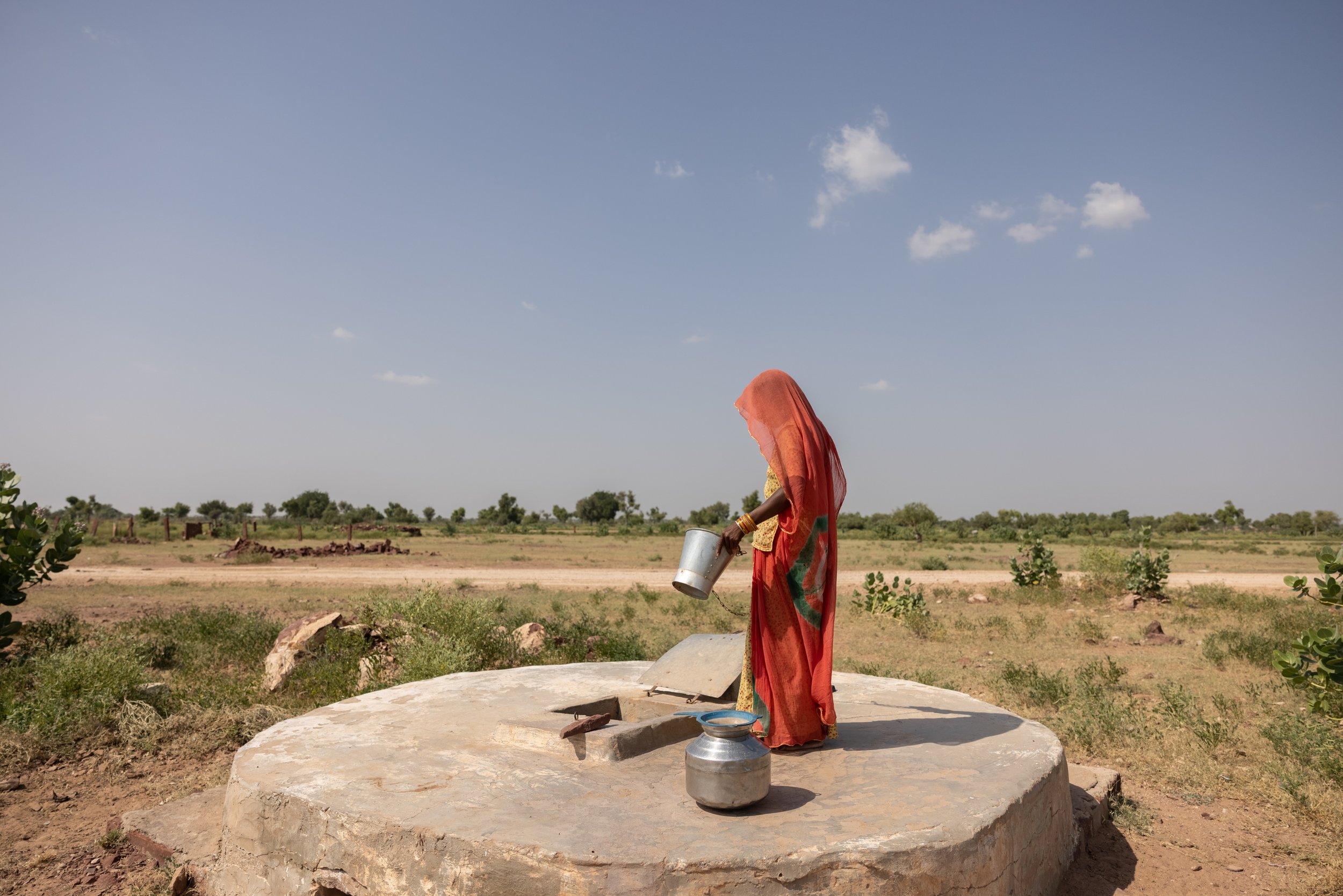
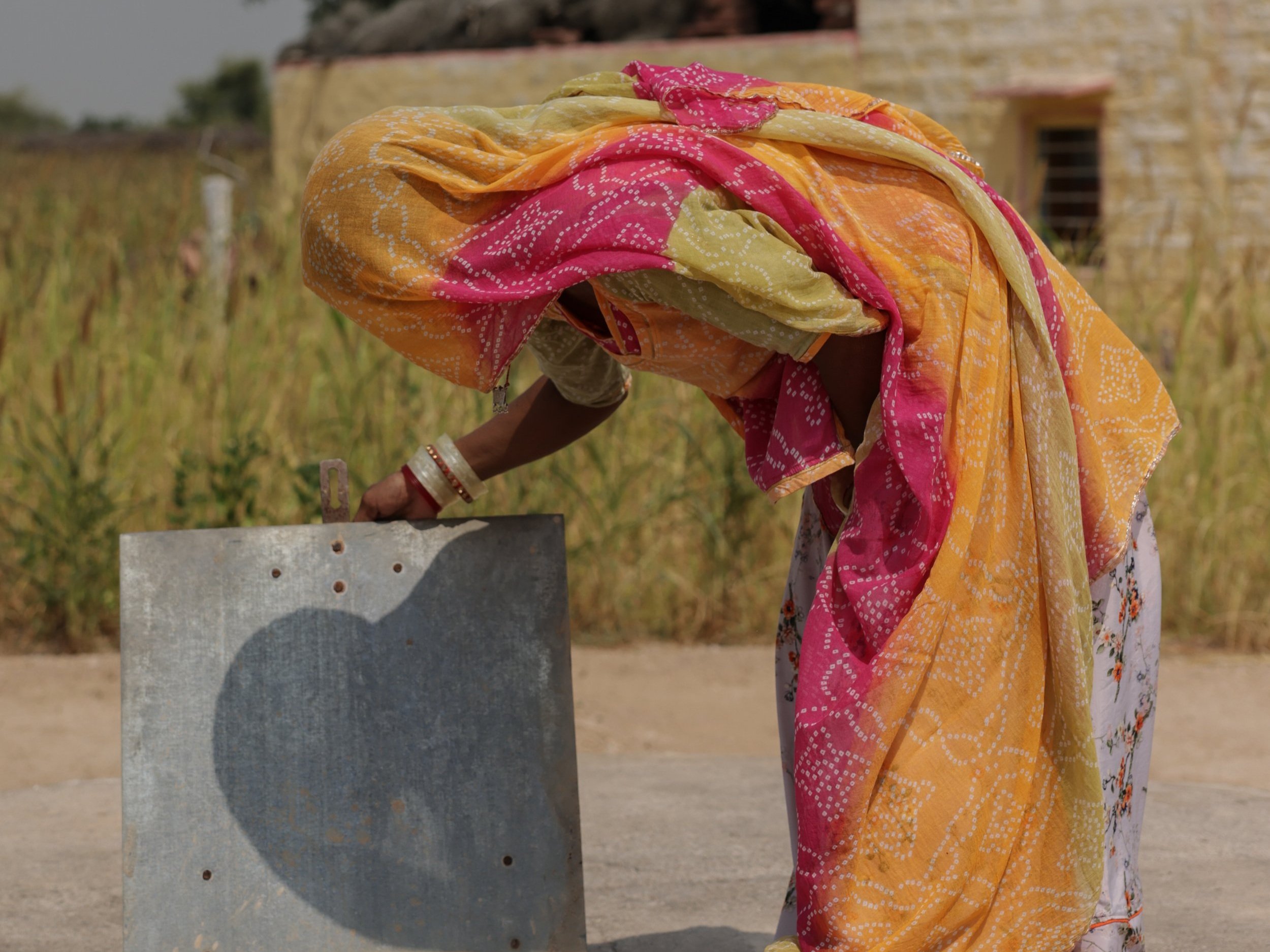
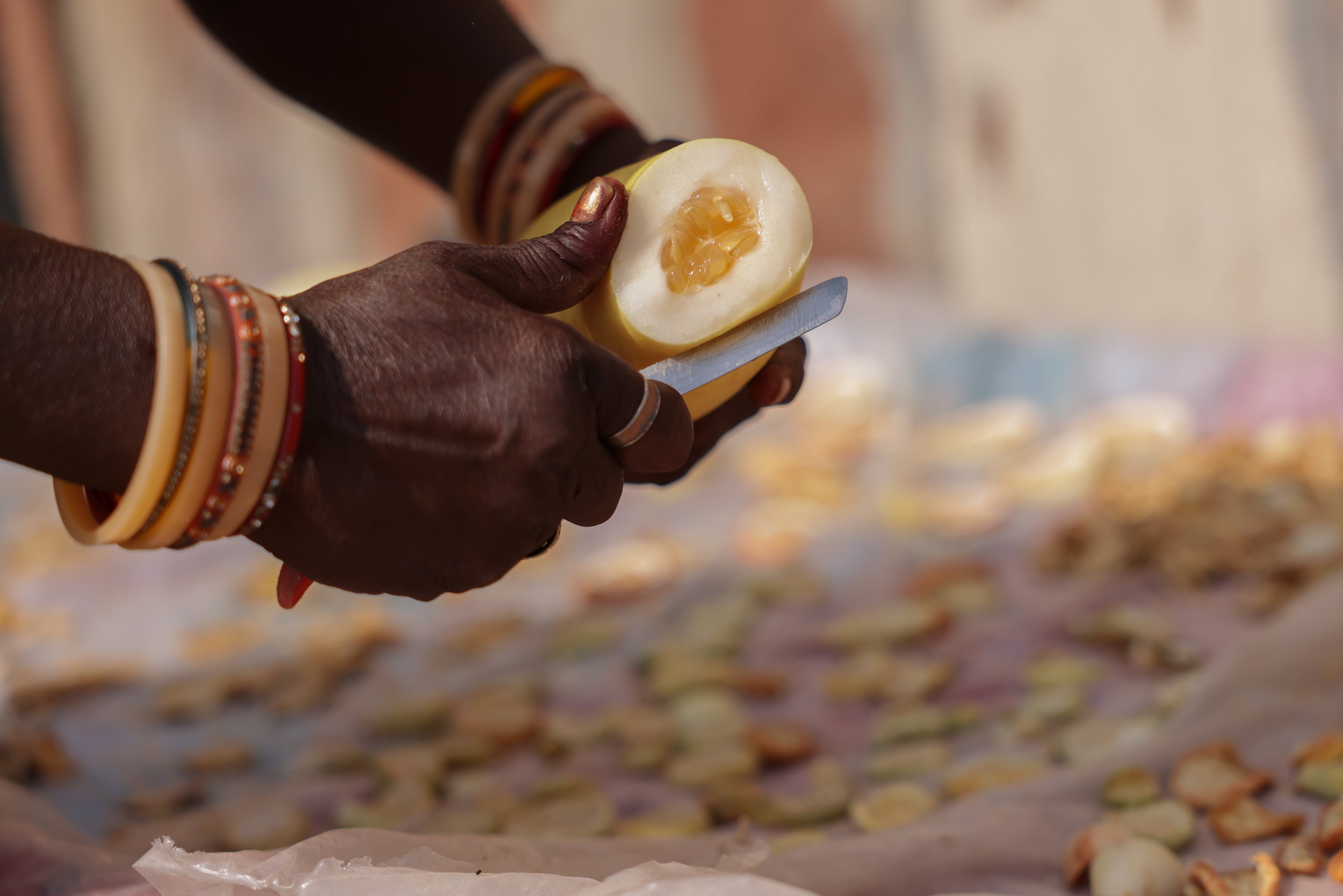
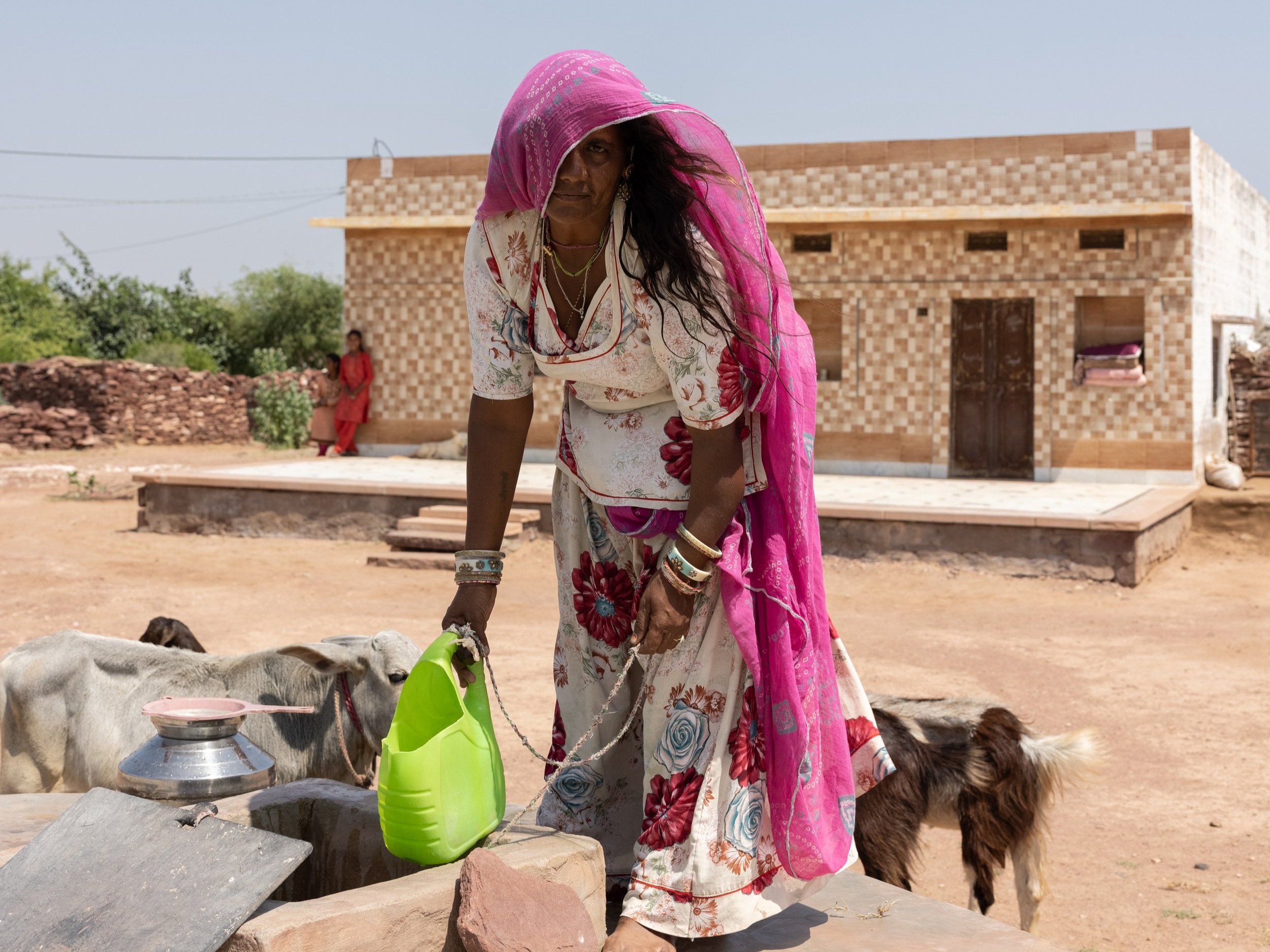
WORDS AND IMAGES BY KAREN COX, EDITED BY TAMARA BLAZQUEZ-HAIK
The Thar Desert in northern Rajasthan, with its subtropical climate, averages 100-200 millimetres of rainfall annually. The arid conditions and rolling sand hills make this region a challenge to traverse. Groundwater is rapidly declining because of lower runoff from thinning glaciers and because of increased usage. Malnutrition is also high here, particularly among females, as the arid soil conditions make it difficult to grow crops.
In the Thar Desert, women and girls are tasked with the responsibility of collecting water, as historically, females in India have been viewed as their family’s water provider, a job that often puts them at risk of being abused or injured in different ways. “Time poverty” is also a key challenge facing these women and girls as they carry out this task; women are not able to work and girls cannot attend school because they spend 5-7 hours per day collecting water.
Mirgo collects water from her rainwater harvesting tank.
Between the 19th and 20th centuries, under British colonial rule, irrigation was introduced to the Thar Desert as a solution to turn arid and semi-arid landscapes into croplands. With this came “greening,” a human-made process to reclaim desert ecosystems for forestry and farming, leading to the introduction of non-native plant species to the Thar Desert, and negatively impacting its ecological community. The combination of irrigation and greening has caused areas within the desert to become infertile and, as a result of waterlogging and the land being too saline to support agriculture, it is unable to provide clean drinking water.
Because young girls and women dedicate their days to providing water to their families, sacrificing their own education and self-development, easy access to clean water is essential to their empowerment.
Water is a precious resource in the Thar Desert. Having access to fresh water through the work of OneProsper has changed the lives of many families in the area.
In order to achieve this, Raju Agarwal founded the nonprofit organization, OneProsper, with the initial aim of empowering women small farmers to grow more crops with drip irrigation. Later, this program evolved into Project Parivartan, named for the Hindi word meaning “transformation,” which is a new program focused on girls’ education. Project Parivartan was co-created by GRAVIS, an NGO that takes an integrated approach to drought mitigation. Alongside GRAVIS and various community groups, OneProsper is working to lessen the effects of the water crisis on those living in the Thar Desert.
A woman working in the horticultural area outside her home.
OneProsper’s creation was inspired by a trip to India, where Raju met a young girl who wasn’t attending school. “She told me she wanted to, but had to take care of her baby brother while her mother worked. The conversation made me realize how many challenges girls face before they can go to school. My journey led me to the Thar Desert, an area where rates of female literacy are lowest. I founded OneProsper to develop cost-effective, sustainable ways of supporting girls to go to school and stay in school.”
To date, OneProsper has changed the lives of 460 girls (230 families with two girls per family) through various ways. One of the most important ones has been guaranteeing access to fresh and clean water by building on-site taankas (rainwater harvesting tanks) for families living in poverty that have two girls. Rainwater harvesting is a sustainable solution for providing people with much-needed water. OneProsper also provides seven-layer biosand filters to ensure that the water is clean.
This solution is an excellent example of grassroots innovation and partnership, and it also demonstrates how ancient methods can be used to solve modern problems. While the first taankas were created by Rajasthan kings in the 17th century for entire communities, more recently, GRAVIS designed a 20,000-litre-capacity taanka specifically for households.
Having collected water from the rainwater harvesting tank, this girl brings the container to her house.
Farm training and seeds have also been provided by OneProsper, which enables families to grow their own fruits and vegetables by setting up a fenced kitchen garden in proximity to their taanka. Women plant fruit tree saplings, including pomegranate, lemon, and plum trees, along with other local fruits and vegetables like chilis, cucumbers, and watermelons. They can then use the water from their taanka to irrigate these crops. As a result, women are able to feed their family more nutritious food, cultivating a wide variety of crops while engaging in sustainable farming practices.
Women here also grow millet on their farmland for income generation, but because of the arid soil conditions, their crop production has been low. To address this problem, OneProsper has built khadins, traditional systems of runoff farming that have been in use since the 15th century in Rajasthan, across women beneficiaries’ farmland. The khadin channels rainwater directly to the soil, thus helping to increase crop production.
From these simple solutions, women now have two viable income streams: they can double their millet production, thus increasing their income from growing this crop, and they are able to work after being freed from the arduous and time-consuming task of water collection.
Working in a ‘khadin,’ which is a system of traditional rainwater harvesting practiced in Rajasthan. Millet is a crop grown extensively in this region.
By developing these various systems, OneProsper is building the capacity of women in the Thar Desert to grow crops and generate income for their families, leading to much greater self-sufficiency and empowerment. These women are now able to break the cycle of colonial legacy and build a better future for themselves. Where previously, they spent hours collecting water each day, today, many of them have access to rainwater harvesting tanks and also access to education. Girls have been given bicycles for easy transport to and from school, along with school supplies, books, and tuition. OneProsper's work thereby provides families with an enduring solution to the water crisis and addresses the many complex interrelated barriers to girls’ education.
Dhapu tends to the livestock after her return from school.
Sangeeta lives with her family, including her sister and grandparents, in a small holding in the Thar Desert. Their taanka provides the family with water for both household use and for growing their own fruits and vegetables. “Both my granddaughters had to walk three kilometres to a water pond and back several times each day. They now attend school and learn. This gives me hope for a better future for them,” says Sangeeta’s grandfather.
In her small kitchen inside the family home, Sunder Devi holds a picture of herself as a young girl and explains how happy she is that both of her daughters can now attend school. “These opportunities were not possible for me when I was a girl,” she says.
Sunder, with her daughter Hemu, showing the plants and crops being grown in the horticultural area near their home.
Yet still today, more than 50% of the girls who live in the Thar Desert are illiterate. For these women and girls, the daily challenges are still many and the basic need for water dominates all else. Extreme temperatures, distances to water sources, and access to food, education, and medical care continue to be constant obstacles. Nothing is easy, yet these women and girls show incredible courage and resilience. Through its efforts to end poverty, female illiteracy, and barriers to education, OneProsper has changed the lives of many families in the Thar Desert, and it will continue this important work in the coming years.
Chirmi and her daughter share some fresh drinking water from the rainwater harvesting tank outside their home.
To learn more about the work OneProsper is doing and how you can help, visit their website.












